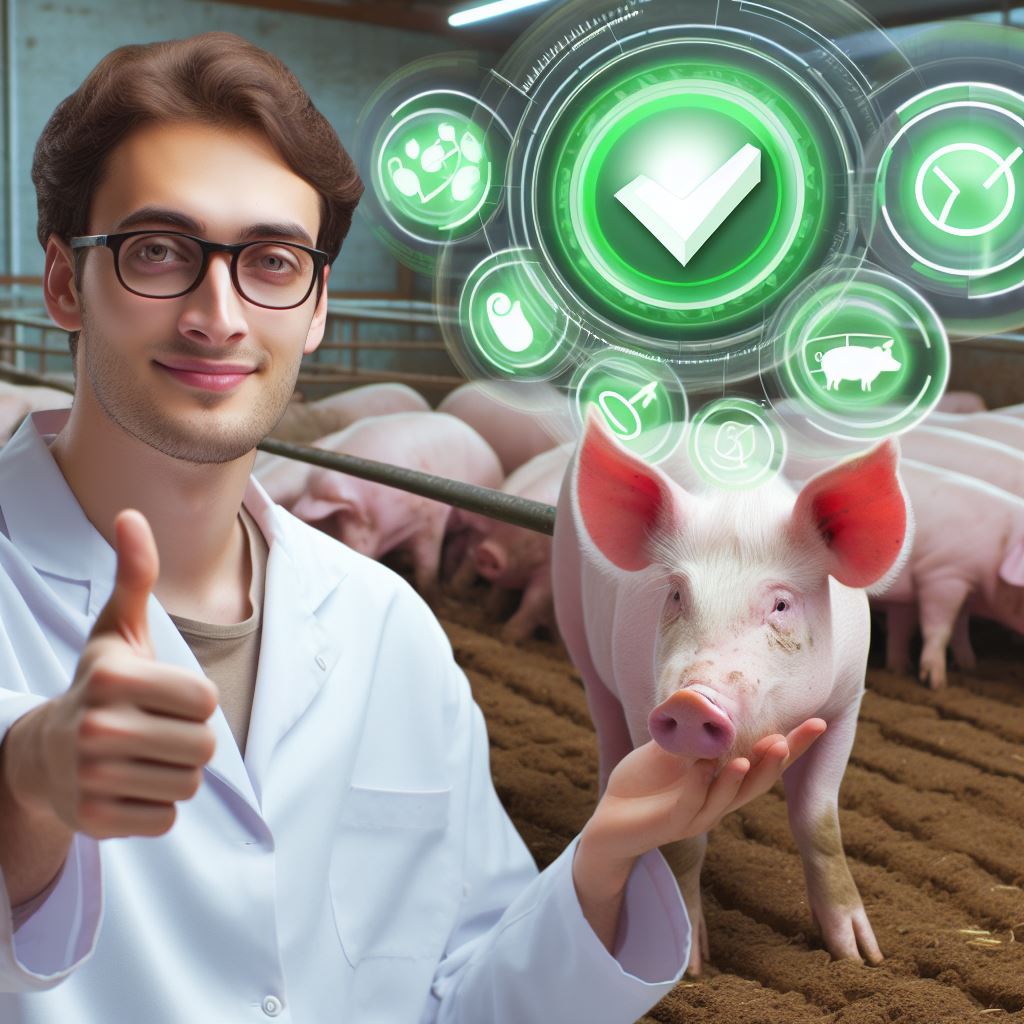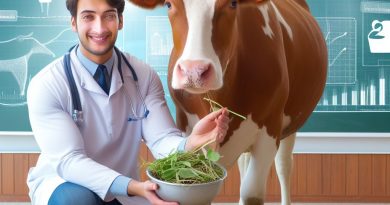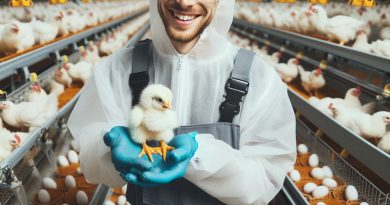Ethical Pig Farming Essentials
Last Updated on March 2, 2024
Introduction
Ethical pig farming is crucial for ensuring the welfare and humane treatment of pigs.
It involves various key elements such as proper housing, nutrition, healthcare, and handling.
Importance of Ethical Pig Farming
Ethical pig farming is essential for promoting animal welfare and reducing the suffering of pigs.
It ensures that pigs are not subjected to unnecessary pain, stress, or discomfort.
Overview of Key Elements
- Proper Housing: Ethical pig farming requires providing pigs with adequate space, clean and comfortable bedding, proper ventilation, and protection from extreme weather conditions.
- Nutrition: Pigs should be provided with a balanced diet, including appropriate amounts of protein, carbohydrates, vitamins, and minerals. Ethical farming aims to prevent malnutrition and optimize pig growth and development.
- Healthcare: Regular veterinary care is essential for maintaining pig health and preventing and treating illnesses. Ethical farming practices include vaccination, parasite control, and appropriate use of medications.
- Handling: Pigs should be handled with care to minimize stress and avoid causing harm. Ethical pig farming emphasizes using low-stress handling techniques and avoiding forceful or violent practices.
Ethical pig farming plays a vital role in ensuring the well-being of pigs and producing high-quality pork products.
By adhering to key elements such as proper housing, nutrition, healthcare, and handling, farmers can contribute to a more compassionate and sustainable pig farming industry.
Read: Herbicides in Pasture Management
Ethical Pig Farming Principles
Pig farming is an industry that requires responsible and ethical practices to ensure the well-being of these intelligent animals.
To achieve this, pig farmers should adhere to certain principles in order to provide optimal living conditions for pigs and promote their welfare.
Providing proper housing and living conditions for pigs
- Adequate space for each pig: Pigs need enough space to move around comfortably, exercise, and engage in natural behaviors. Crowded and cramped conditions can lead to stress and health issues.
- Cleanliness and hygiene in pig housing: Regular cleaning and proper waste management are necessary to maintain a healthy environment for pigs. This helps prevent the spread of diseases and parasites.
Ensuring the welfare and health of pigs
- Providing a balanced diet and access to clean water: Pigs should be fed a well-balanced diet that meets their nutritional needs. Access to clean and fresh water is vital for their hydration and overall health.
- Regular veterinary care and monitoring: Pigs should receive regular health check-ups and vaccinations to prevent diseases. Farmers should closely monitor their pigs’ health and promptly address any issues that arise.
Promoting natural behaviors and minimizing stress
- Encouraging social interaction among pigs: Pigs are social animals that thrive in the company of their own kind. Farmers should provide opportunities for pigs to interact and engage in natural social behaviors.
- Providing enrichments for mental stimulation: To prevent boredom and stress, farmers should provide enrichments such as toys, rooting materials, and objects for exploration. This helps stimulate their minds and satisfies their natural instincts.
By following these ethical pig farming principles, farmers can ensure the overall well-being and happiness of their pigs.
Ethical practices not only benefit the animals but also contribute to the production of high-quality pork products.
Consumers can play a role by supporting farms that prioritize animal welfare and promote ethical pig farming practices.
Together, we can create a more compassionate and sustainable future for pig farming.
Read: Sustainable Sheep Rearing Tips

Sustainable Pig Farming Practices
Implementing environmentally friendly farming methods
Efficient use of resources such as water and energy
To achieve sustainable pig farming, it is crucial to implement farming methods that promote efficient use of resources.
This includes optimizing the use of water and energy within the farm.
By carefully monitoring and managing water consumption, pig farmers can minimize waste and ensure that water resources are not depleted.
Similarly, adopting energy-efficient practices, such as using renewable energy sources, can help reduce the farm’s carbon footprint.
Proper waste management and reducing pollution
Another important aspect of sustainable pig farming is proper waste management and reducing pollution.
Pig farms generate significant amounts of waste, including manure, which, if not managed properly, can lead to pollution of water bodies and soil.
Implementing effective waste management practices, such as composting or anaerobic digestion, can help convert waste into valuable resources while minimizing its environmental impact.
Additionally, installing advanced waste treatment systems can further reduce the risk of pollution.
Supporting local communities and the economy
Establishing relationships with local suppliers and businesses
Sustainable pig farming involves more than just caring for the pigs; it also means being a responsible member of the local community.
Pig farmers can play a vital role in supporting the local economy by establishing relationships with local suppliers and businesses.
By sourcing inputs, such as feed or veterinary services, from nearby suppliers, farmers can contribute to the growth and sustainability of local businesses.
Creating job opportunities within the community
Furthermore, sustainable pig farming practices should prioritize creating job opportunities within the local community.
By providing employment opportunities, pig farmers can contribute to the economic well-being of the community.
This can be achieved by hiring local residents or partnering with vocational training programs to provide relevant skills and employment opportunities to individuals within the community.
Ensuring long-term viability of pig farming
Investing in research and innovation
To ensure the long-term viability of pig farming, continuous investment in research and innovation is essential.
Technology and scientific advancements play a critical role in improving the efficiency and sustainability of farming practices.
Pig farmers should actively seek out research partnerships and collaborate with experts to stay updated with the latest developments in the industry.
By investing in research, farmers can enhance their knowledge and implement innovative techniques that have a positive impact on pig farming.
Continuous improvement and adaptation to changing regulations
Lastly, sustainable pig farming requires continuous improvement and adaptation to changing regulations.
The agricultural industry is subject to evolving environmental regulations meant to minimize its ecological footprint.
Pig farmers need to stay informed about these regulations and make necessary adjustments to their farming practices accordingly.
By staying proactive and responsive to regulatory changes, farmers can ensure compliance and contribute to the long-term sustainability of pig farming.
Therefore, sustainable pig farming practices encompass various aspects, including implementing environmentally friendly farming methods, supporting local communities and the economy, and ensuring long-term viability.
Efficient resource use, proper waste management, and reducing pollution are crucial for minimizing the environmental impact.
Building relationships with local suppliers, creating job opportunities within the community, and investing in research and innovation contribute to the overall sustainability of pig farming.
Additionally, continuous improvement and adaptation to changing regulations are vital for the industry’s long-term viability.
By adopting these practices, pig farmers can contribute to a more sustainable and ethical pig farming industry.
Read: Eco-Friendly Beef Farming: A Guide
Transparency and Communication
Transparency and communication play a crucial role in establishing trust between pig farmers and consumers.
By openly sharing information and addressing concerns, farmers can foster a sense of trust and confidence in their ethical farming practices.
Building trust through open communication
To build trust, pig farmers must proactively share information about their farming practices with consumers.
This includes providing details about how pigs are raised, fed, and cared for.
By being transparent about these practices, farmers can reassure consumers about the ethical treatment of animals.
In addition, farmers must also be responsive to questions and concerns from the public.
This means actively engaging with consumers, whether through social media, websites, or public forums.
By promptly addressing queries and addressing concerns, farmers can demonstrate their commitment to open communication and building trust with consumers.
Implementing traceability and quality assurance systems
Traceability is a key aspect of pig farming that promotes transparency and accountability.
Farmers need to monitor and document the entire pig farming process, from breeding and feeding to transportation and processing.
This ensures that every step is traceable, allowing for greater visibility and confidence in the ethical practices employed.
Moreover, certifications and labeling can further inform consumers about the ethical practices implemented by pig farmers.
Certifications such as free-range or organic indicate that specific standards have been met regarding animal welfare and environmentally sustainable farming methods.
Proper labeling enables consumers to make informed choices and support ethical pig farming practices.
Ultimately, transparency and communication are essential components of ethical pig farming.
By openly sharing information, addressing concerns, implementing traceability measures, and providing certifications and labeling, pig farmers can build trust and establish a strong relationship with consumers.
This not only benefits farmers themselves but also ensures that consumers can make informed choices and support ethical pig farming practices.
Read: Pasture Renovation: When & How
Find Out More: Cattle Breeding 101: Essentials to Know
Conclusion
Recap of the importance of ethical pig farming essentials.
In this section, we have explored the various ethical practices necessary for sustainable pig farming.
We have discussed the importance of providing pigs with proper living conditions, nutrition, and healthcare.
It is crucial for farmers to prioritize the welfare of their pigs and to implement ethical farming practices.
Encouragement for farmers and consumers to prioritize ethical practices.
By adopting ethical pig farming practices, farmers contribute to the health and well-being of pigs, promote sustainable agriculture, and provide consumers with high-quality pork products.
Consumers play a vital role in driving demand for ethically raised pork, which ultimately encourages more farmers to adopt ethical farming practices.
Together, farmers and consumers can create a positive change in the pig farming industry.
Final thoughts on the future of ethical pig farming.
The future of pig farming lies in the hands of those who prioritize ethical practices.
It is essential for farmers and consumers to recognize the significance of ethical pig farming essentials in ensuring the welfare of pigs, the sustainability of the industry, and the production of safe and high-quality pork.
As awareness grows and demands for ethical pork continue to rise, the industry will evolve and improve, leading to a more ethical and sustainable future for pig farming.


